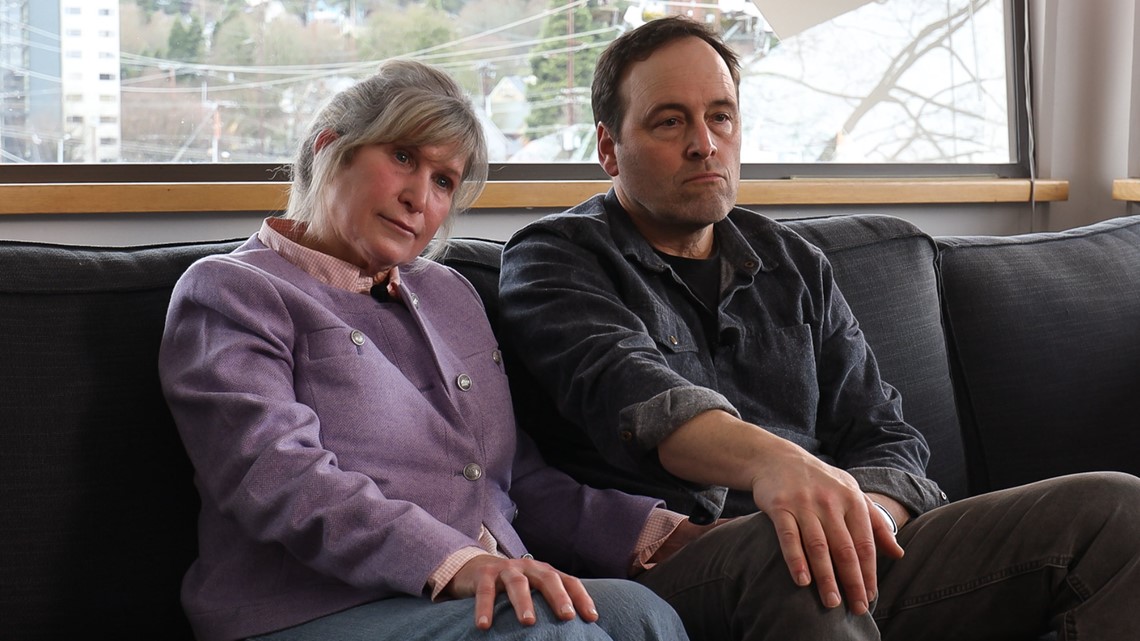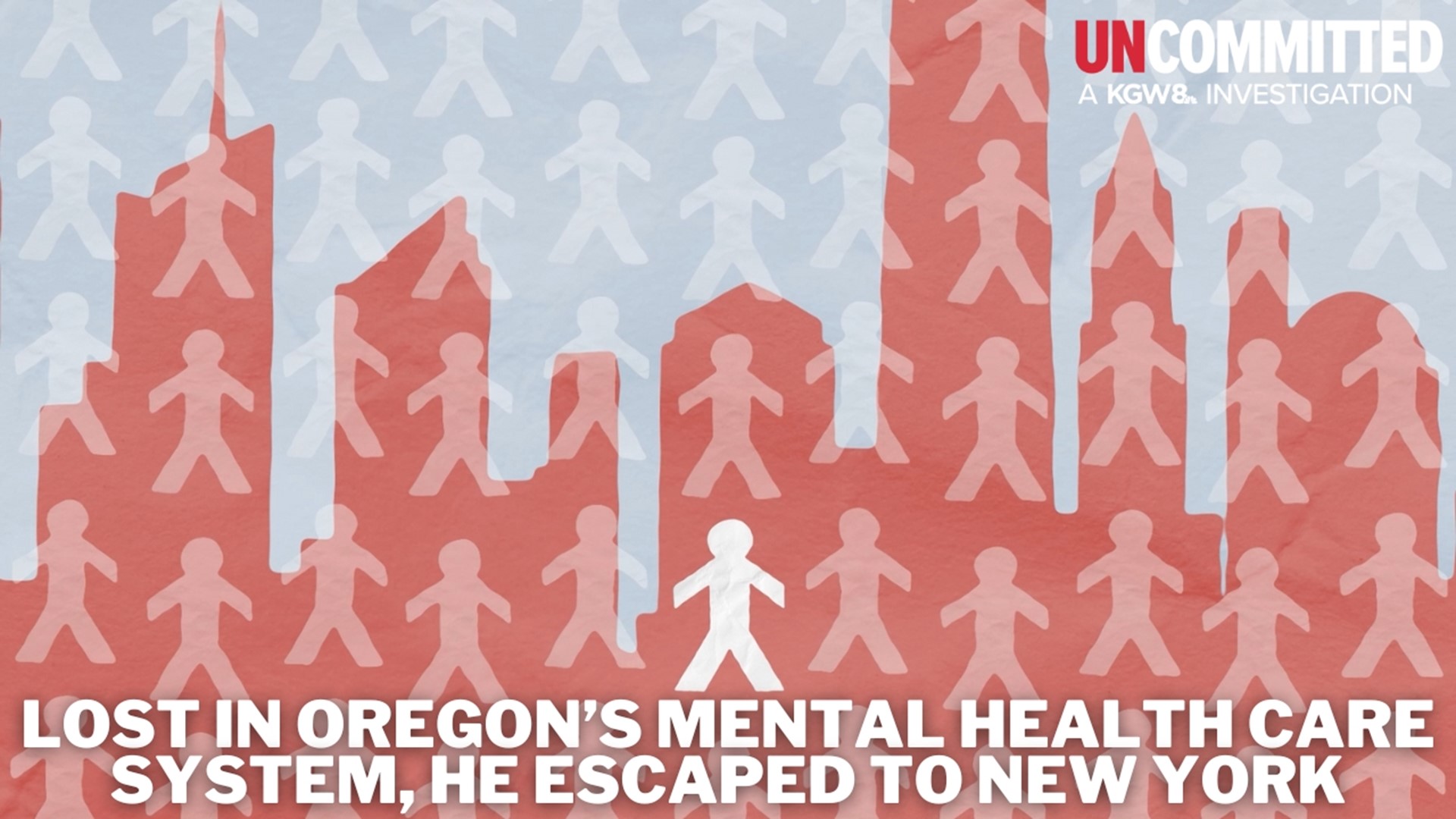PORTLAND, Ore. — After his overnight release from a Portland hospital for not meeting Oregon standards for forced mental health care, Jeff Rott’s son flew to New York City while experiencing hallucinations.
“Our son got on a plane in psychosis,” Rott told KGW. “Was he a danger? Yeah, to everyone on that plane!”
The case highlights the differences in severe mental illness treatment between Oregon and other states.
In New York, Rott’s son received involuntary medication and mental health care — treatment that he was not able to receive in Oregon because of the state’s "imminent" danger threshold for grave disability and civil commitment.
His parents say he’s now doing better and managing his mental illness, something they couldn’t achieve in Oregon.


A change in disposition
Reflecting on more than three decades of marriage, Jeff Rott and Kathy Shaughnessy talk about their son, now 29, as a supremely kind and gentle person.
“We couldn’t squash bugs in the house, (we'd) have to take them outside,” Shaughnessy said, something that their son required.
His nature made his development of severe mental illness and psychotic outbursts even more startling.
“Completely blindsided, right? From the son that was studying for medical school to all of a sudden somebody who’s starting to disconnect from reality,” Rott said.
RELATED: At the intersection of homelessness, mental illness and addiction in Portland lies psychosis
Their son was diagnosed with schizophrenia. While wanting to share their experiences, Rott and Shaughnessy asked KGW not to name their son as he’s getting better with care, and they don’t want to potentially jeopardize that.
His symptoms of psychosis started in college. Jeff and Kathy said he’d hear things, said people were spying on him, and one night he walked from Portland to Newberg on the highway.
“Because they think there's nothing wrong with them, right?” Rott said.
Rott and Shaughnessy said they felt lucky because during some psychotic episodes, their son agreed to stay at the hospital.
“He would get to the ER, he would hopefully say the magic words, ‘I'm thinking about killing myself,’ and they would put him into behavioral health and then he would stay,” Rott said.
However, if he turned down medication and doctors decided he wasn’t a danger to himself or others, by Oregon law they couldn’t force treatment.
New York, New York
In 2019, Jeff and Kathy said a Portland-area hospital released their son without warning, sending him on his way with a bus pass.
“We had been there every day — his family, who are obviously going to be his caretakers — and they just let him go,” Rott said.
The next morning, Rott woke up and checked his phone.
“We tracked his phone … I looked at the map, and (the dot) was usually over here in Portland and the map just slid over,” Rott said. “Oh no, he was in New York, New York City.”
Their son, experiencing psychosis and hallucinations, had bought a plane ticket and flown across the country.
“What do you do?" Rott said. "He’s in a city of millions of people and he’s in psychosis with hallucinations that he's at Juilliard Dance School, that he's a writer for Saturday Night Live, that he’s dating a supermodel who lives there.”
Rott said his son was clearly a danger to anyone around him.


They called the New York Police Department and told them what had happened. Police officers later found their son and took him to a hospital where he denied medication and treatment, but the New York facility held him anyway.
“They weren't going to let him go back until he was okay,” Rott said. “They knew they needed to help him, and here in Portland and Oregon, they streeted him.”
Rott and Shaughnessy had tried to get treatment for their son for years in Oregon without success due to state standards and a system that often waits for a crime to be committed before mandating care.
Rott said he saw a different way forward in New York.
“New York really cared about him, I mean that’s the simplest way to put it,” he said.
The NY facility sent his son to mental health court, where lawyers and a judge discussed involuntary treatment, while Rott listened to what he described as a willingness to work it out.
“It was beautiful because what you got to watch was a judge and (lawyers) who really cared about him work it out,” Rott said. “The judge asked if we give him this medication and time is he going to return back to his normal life? And everybody said yes and so the judge (ordered it).”
'We're the monsters'
Two months after being admitted, Rott walked in on one of his daily visits to see his son, expecting his son to be combative or dismissive.
“He wouldn't recognize me as who I was, and I walked in and he said, ‘Hey dad,'” Rott said, tears coming to his eyes.
Rott said forced medication and the treatment infrastructure in New York worked to restore his son’s mental competency, as he hadn’t been able to recognize his illness beforehand.
New York law doesn’t require "imminent danger" for forced treatment — a high bar that can be difficult to reach. New York also has more than 2,500 civil beds.
In contrast, Oregon’s civil commitment law requires imminent danger for a person to meet the grave disability requirement. Oregon has less than 50 civil beds at the state hospital and stopped admitting almost any civil patients to the state hospital over the last five years.
The result — people with severe mental illness often only receive severe mental illness treatment after they commit a crime that sends them to jail.
Rott said he sees news stories where someone in a mental health crisis has committed a serious crime.
“The world will label that person a monster or this horrible piece of trash," he said, "and meanwhile, it could have been my son.”
He said he believes Oregon’s current system sets people up for failure without access to lasting care, either through involuntary treatment or secure mental healthcare bed space.
“We're the monsters, we collectively didn't help this person who needed help,” he said.
This is part three of a three-part KGW "Uncommitted" series exploring how Oregon has effectively criminalized severe mental illness over the past five years, often waiting for individuals to commit a serious crime before mandating treatment. The report will air at 6:30 p.m. during KGW’s The Story broadcast. An additional story on possible solution and efforts to fix the system can be found here.

